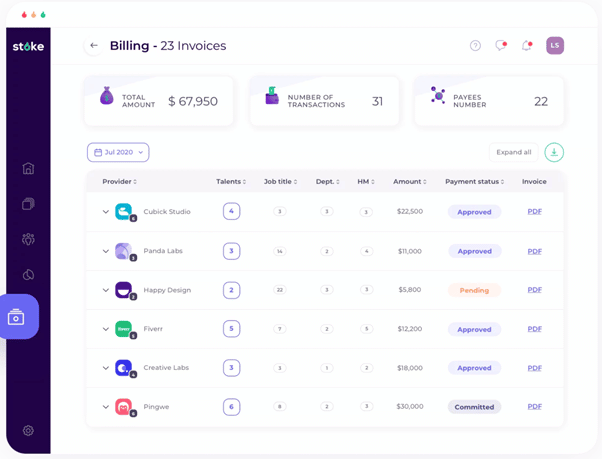The COVID-19 pandemic resulted in a new trend among large organizations—instead of employing full-time workers in the office space, many companies are switching to freelancers and remote teams to handle projects and tasks. The practice may sound simple, efficient, and easy on paper, but the whole gig comes with its own set of niggles and headaches.
Apart from having to deal with the scheduling nightmare of working with dozens of freelancers in different time zones, you need to take care of the legal requirements such as contracts, payments, and invoices. You can always use contract templates prepared by Indy.
This is where a freelance management system comes to the rescue. Before we give you all the reasons to invest in a freelance management system, you need to understand what a freelance management system is in the first place.
What’s A Freelance Management System?
A freelance management system is a cloud-based software solution that helps a company handle freelancers and any kind of remote team. Typically, a company that manages between 100 to 10,000 freelancers needs to invest in a system that helps them keep track of everything, including freelancer onboarding, managing tasks, tracking projects, payment dues, and invoices.
Instead of hiring in-house employees, companies are inclined to work on contract-based projects and utilize specific talents and skillsets from freelancers around the world. The hiring process is fairly straightforward but manually managing the other mundane and repetitive tasks such as onboarding, payments, invoices, and project management in different time zones is time-consuming and onerous.
If you are still not convinced then read further about the top 7 reasons to invest in a freelance management system.
1. Working With Multiple Freelance Marketplaces
Many companies and startups usually rely on marketplaces such as UpWork, Fiverr, 99Designs, Toptal, etc. to hire freelancers. Every freelance marketplace offers a separate account setting to manage all your hires.
When you are handling multiple teams among various marketplaces, it can be difficult to keep track of everyone’s working hours, projects, tasks, and payments across the various freelance marketplaces.
Using a freelance management system, you can centralize the whole process and keep track of freelancers in a single place. No need to juggle among freelance marketplaces.
2. Foster Long-Lasting Relationship With Freelancers
It can be irritating when a freelancer decides to leave the company in the middle of a project. If you regularly hire freelancers, you know that most freelancers and contractors don’t last more than 3 months in a company.
Using a freelance management system not only improves your relationship with freelancers but also keeps the whole process as transparent as possible. Freelancers appreciate when you make them feel a part of the team and not some part-time temporary employee.
3. Save Time Finding Freelancers
Instead of spending hours of your precious time looking for freelancers in freelance marketplaces like UpWork and Fiverr, you can create your own database for the company to meet future freelance requirements.
When you are frequently required to work with freelancers, you end up with a huge database of freelancers over time. Instead of saving that information on an Excel sheet, you can opt for a freelance management system to save all the relevant data such as freelancer name, work history, contact details, area of expertise, address, and more.
4. Seamless Payment Process
Every freelancer cares about timely payments. An unnecessary delay in payment is one of the main reasons they cite for switching teams or companies.
Major corporations have finance teams that take care of all the payments, taxes, and other legal requirements. Sometimes, you might get caught in the complications between freelancers and the finance department and that may lead to a delay in payments to the freelancer.
Using a freelance management system, you can take care of everything from payment status and amount to be paid to auto-generate invoices. The software also covers multiple payment methods such as Payoneer, PayPal and Wire, and multiple currencies.
5. Easy Data And System Access
Freelancer onboarding is one of the toughest tasks for you as a project manager. For every freelancer, you need to create another profile and give them relevant access to data and the system.
It can be time-consuming, especially when you are dealing with a number of freelancers at a time. A freelance management system takes care of all of it and makes the onboarding experience as flawless and smooth as possible.
6. Gain Visibility
A searchable database of the company’s freelance network allows you to access all the details like contact details, rate, work history, performance, and payment history. With this data at your fingertips, you can save money and time and hire freelancers based on suitability.
7. Manage Projects
Most companies opt for a project management solution such as Trello, Jira, Asana, etc. to manage large projects. A freelance management system takes away the pain of using an additional project management software.
Software solutions such as Stoke Talent allow you to assign tasks and handle and manage projects like a pro from a single interface. The software also takes care of admin and logistics tasks like getting freelancers to sign legal documents. Overall, you don’t have to waste too many hours per week on irrelevant tasks.
Handle Freelance Projects Like A Pro
Investing in a capable freelance management system is crucial these days. You need to stay on top of the project while leaving all other details like payments, invoices, and tax and legal documents to the freelance management system.
If you are interested in even more business-related articles and information from us here at Bit Rebels, then we have a lot to choose from.



COMMENTS